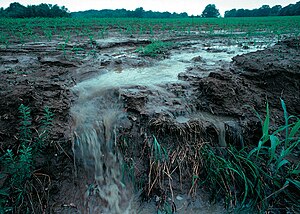 Image via WikipediaChemical fertilizers are quick-acting, short-term plant boosters and are responsible for:
Image via WikipediaChemical fertilizers are quick-acting, short-term plant boosters and are responsible for: 1. Deterioration of soil friability creating hardpan soil
2. Destruction of beneficial soil life, including earthworms
3. Altering vitamin and protein content of certain crops
4. Making certain crops more vulnerable to diseases
5. Preventing plants from absorbing some needed minerals.
The soil must be regarded as a living organism. An acid fertilizer, because of its acids, dissolves the cementing material, made up of the dead bodies of soil organisms, which holds the rock particles together in the form of soil crumbs. This compact surface layer of rock particles encourages rain water to run off rather than enter the soil.
For example, a highly soluble fertilizer, such as 5-10-5, goes into solution in the soil water rapidly so that much of it may be leached away into our ground water without benefiting the plants at all. This chemical causes the soil to assume a cement-like hardness. When present in large concentrations, they seep into the subsoil where they interact with the clay to form impervious layers of precipitates called hardpan.
Many artificial chemical fertilizers contain acids, as sulfuric and hydrochloric, which will increase the acidity of the soil. Changes in the soil acidity (pH) are accompanied by the changes in the kinds of organisms which can live in the soil. For this reason, the artificial fertilizer proponents tell their customers to increase the organic matter content of their soil or use lime to offset the effects of these acids.
 Image via WikipediaThere are several ways by which artificial fertilizers reduce aeration of soils. Earthworms, whose numerous borings made the soil more porous, are killed. The acid fertilizers will also destroy the cementing material which binds rock particles together in crumbs.
Image via WikipediaThere are several ways by which artificial fertilizers reduce aeration of soils. Earthworms, whose numerous borings made the soil more porous, are killed. The acid fertilizers will also destroy the cementing material which binds rock particles together in crumbs.Chemical fertilizers rob plants of some natural immunity by killing off the micro organisms in the soil. Many plant diseases have already been considerably checked when antibiotic producing bacteria or fungi thrived around the roots. When plants are supplied with much nitrogen and only a medium amount of phosphate, plants will most easily contract mosaic infections. Host resistance is obtained if there is a small amount of nitrogen and a large supply of phosphate. Fungus and bacterial diseases have been related to high nitrogen fertilization, and lack of trace elements.
Plants grown with artificial chemical fertilizers tend to have less nutrient value than organically grown plants. For example, several tests have found that by supplying citrus fruits with a large amount of soluble nitrogen will lower the vitamin C content of oranges. It has also been found, that these fertilizers that provide soluble nitrogen will lower the capacity of corn to produce high protein content.
Probably the most regularly observed deficiency in plants treated continually with chemical fertilizers is deficiencies in trace minerals. To explain this principle will mean delving into a little physics and chemistry, but you will then easily see the unbalanced nutrition created in chemical fertilized plants.
We will get into this a little more in our next post, so be sure to check back on Thursday to learn more, including the risks of chemical contaminants in the groundwater, dangers of food poisoning, genetic modifications, and more....

No comments:
Post a Comment